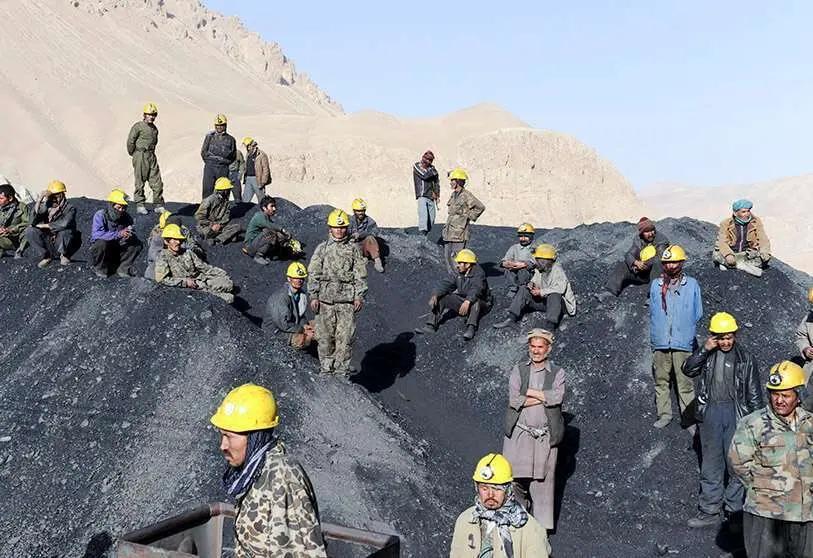Economic powers eye Afghanistan's natural resources, now under Taliban control, with ambition

Under Afghanistan's soil lie important and valuable natural resources such as iron, copper, chrome, zinc, lead and marble. There is also a wealth of precious stones and key materials for technology, such as lithium and cobalt. In addition, there are oil and natural gas reserves in the north.
In 2020, it was estimated that 90 per cent of Afghans lived below the poverty line. In a recent World Bank report, the Afghan economy was described as 'fragile and aid-dependent'. However, the country's natural resources could boost its economy and thus improve the social situation. As the US military and geologists revealed in 2010, minerals could be worth $1 trillion. Another report by the Afghan government in 2017 estimated that all mineral wealth, including fossil fuels, would be worth $3 trillion. "Our country could be richer if you help it exploit minerals," declared former president Hamid Karzai in 2010.
Afghanistan's reputation for natural resources goes back a long way. The first explorations were carried out in the 19th century, and by 1930, 571 deposits had been recorded, as reported by the Russian media RT. Soviet troops were also involved in research, discovering a superior quality of copper at Aynak.

Despite Afghanistan's great potential, years of war and instability have made it difficult for minerals and resources to be properly exploited and managed. In addition, some of the country's internal conflicts have been exacerbated by this great mineral treasure. "Disputes over the management of natural resources such as land, water, timber, minerals and drugs underpin and drive many of these conflicts and often serve to exacerbate existing ethnic, political and regional divisions," warns the UN. By contrast, if Afghanistan were to achieve stability and begin to properly exploit its natural resources, it could become one of the richest countries in the region in as little as a decade, as Said Mirzad of the US Geological Survey told Science magazine in 2010.
However, security problems and lack of infrastructure have prevented the proper extraction of these resources. The uncertain future of the country since the Taliban came to power may prevent many foreign companies from investing in the country in the absence of a legal and security framework. Nevertheless, there are some countries that aspire to control Afghan resources now that NATO no longer has a presence in the country. China plays a key role here, as it is the largest foreign investor in Afghanistan. In 2008 it began exploiting the Aynak copper mine, 35 kilometres from Kabul.
Beijing also held talks with the Taliban before the takeover of Kabul with the aim of gaining access to the mines once the insurgents came to power. China seeks to control untapped deposits, such as lithium and rare earths, a move that would give it a big advantage in its competition with the United States and Europe. China already produces 40 per cent of the world's copper, almost 60 per cent of lithium and more than 80 per cent of rare earths, according to the International Energy Agency (IEA).

"The Taliban takeover comes at a time when supplies of these minerals are likely to be tight for the foreseeable future, and China needs them," explains Michaël Tanchum of the Institute for European and Security Policy to Germany's DW. In order to increase its economic presence in Afghanistan, Beijing has been quick to welcome the Taliban. "China is ready to develop friendly and cooperative relations with Afghanistan and to play a constructive role," said a Chinese foreign ministry spokeswoman. From the establishment of the Emirate in 1996 until the fall of the Taliban after the US invasion in 2001, Kabul and Beijing also maintained close relations.
Taliban leader Abdul Ghani Baradar has welcomed China's statements, saying he expects it to "play an important role in the future reconstruction and economic development of Afghanistan".
One of the most important materials in the Central Asian country is lithium, which is essential for electric cars, mobile phones and laptops. According to the IEA, China, the Democratic Republic of Congo and Australia account for 75 per cent of the world's lithium and cobalt production.

Pakistan, another of Afghanistan's neighbours, may also start investing in the country's mines. Islamabad, which established relations with the Taliban as early as 1996, has maintained ties with the insurgents. Over the past two decades, the Taliban have repeatedly come to Pakistan for military training or medical care. The Pakistani government has even been accused of providing military aid to the Islamists, although the government denies this.
On the other hand, Russia may seek to regain its influence in Afghanistan. Although Moscow has considered the Taliban a terrorist group since 2003, Russian authorities have organised talks with the movement and other opposition forces. Vladimir Dzhabarov, deputy chairman of the Russian Senate's international affairs committee, said they would wait "a little" before recognising the Taliban government. "If we see that they guarantee order and improve the lives of their citizens, then there will be normalisation," he said. Moscow, during the Soviet invasion of Afghanistan, began extracting materials from the country such as chrome, uranium, emeralds and hydrocarbons. It also obtained Afghan oil throughout the 1960s.

Against this backdrop, the US and Europe will have to make a choice regarding Afghanistan's economic potential. The two Western powers will have to choose between watching other countries share the country's valuable resources, or entering into economic relations with the Taliban, something that will undoubtedly cause public criticism and call into question their commitment to human rights.









